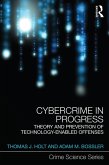Drawing on a wide range of literature, Holt and Bossler offer an extensive synthesis of numerous contemporary topics such as theories used to account for cybercrime, policing in domestic and transnational contexts, cybercrime victimization and issues in cybercrime prevention. The findings provide a roadmap for future research in cybercrime, policing, and technology, and discuss key controversies in the existing research literature in a way that is otherwise absent from textbooks and general cybercrime readers.
This book is an invaluable resource for academics, practitioners, and students interested in understanding the state of the art in social science research. It will be of particular interest to scholars and students interested in cybercrime, cyber-deviance, victimization, policing, criminological theory, and technology in general.
Dieser Download kann aus rechtlichen Gründen nur mit Rechnungsadresse in A, B, BG, CY, CZ, D, DK, EW, E, FIN, F, GR, HR, H, IRL, I, LT, L, LR, M, NL, PL, P, R, S, SLO, SK ausgeliefert werden.
Peter Grabosky, Professor Emeritus, Australian National University, Australia
"Cybercrime in Progress is by far the most comprehensive yet incisive book on cybercrime available anywhere. It is written with clarity, authority and vision, so well written, in fact, that it would be an appropriate text for any undergraduate or graduate class. The title Cybercrime in Progress captures the essence of cybercrime: it is a moving and fluid target, changing constantly, creating new opportunities for offenders; new challenges for society's traditional responses to crime. Many people may think that cybercrime is too technical to understand. This book will change all that. Holt and Bossler are masters of their craft: they succinctly sum up the short history of cybercrime, point to the gaps in our responses to it, and tell us exactly what we must do in the future if we are to control it."
Graeme Newman, Distinguished Teaching Professor, University at Albany, USA
"Thomas Holt and Adam Bossler have done a really great job in locating cybercrimes and the future development of online criminal opportunities within the context of the various criminological debates. This book should not only help students undertake their studies into cybercrime, but also assist established scholars in coming to grips with this interesting, but constantly shifting area of interdisciplinary study."
David S. Wall, Professor of Criminology, University of Leeds, UK









